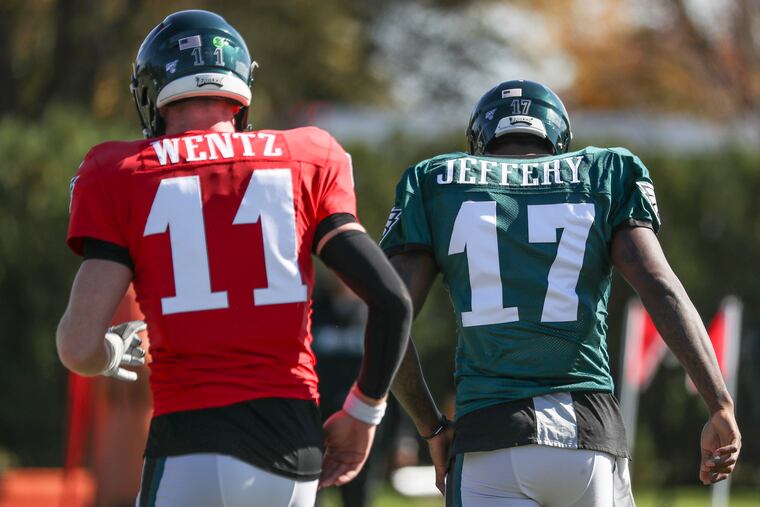Eagles should bring back, not cast off, Alshon Jeffery | Bob Ford
They're going to spend the same either way. Might as well get something out of him.

The Eagles will spend approximately $26 million over the next two seasons to end their relationship with wide receiver Alshon Jeffery. On that, there is no disagreement.
The only question is how they spend it, and that is where the Eagles have an interesting choice.
As for most of the fan base, the decision is apparently easy: Get rid of him. Get rid of his pouty, injured, Josina-Anderson-tattling, useless, old butt.
There is some merit to that point of view. Jeffery, as much as can be determined from the outside, isn’t the greatest for locker room harmony. Even if he were not the anonymous voice complaining about quarterback Carson Wentz’s choice of targets and affection for overthinking the game, Jeffery often says volumes just with his body language.
Then, there is the matter of the type of receiver Jeffery presents on the field. Wentz prefers that his receivers – be they wideouts, slot receivers, tight ends, or running backs – are open when he throws them the ball.
For Jeffery, this presents a problem because he is rarely open, but his history suggests that doesn’t really matter. He’s better at catching the ball than the little dude on his hip, and has made a good living as a target receiver.
It’s the same $26 million either way. You either get one season with a 30-year-old wide receiver playing for his next contract, or you get zero seasons of a guy who does present a few negatives.
Taking everything into account, however, wouldn’t the Eagles be better making their fresh start for the 2020 season – assuming there is one – by releasing Jeffery and absorbing the $26.1 million (the exact figure, for those who demand exactitude) dead cap charge that would entail?
All of that hit would have been taken immediately, making such a move nearly impossible, until the league and the players association came to terms on a new collective bargaining agreement in March. Now, the hit can be divided over two seasons if Jeffery is designated as a post-June 1 cut, and the organization could do that today if it chose.
So far, that hasn’t been the choice, and with each day that passes, it looks more likely that Jeffery will return.
Howie Roseman, the general manager and vice president of football operations, certainly sang that tune in recent interviews, whether because it is in harmony with the team’s intention, or to shake loose potential suitors. If another team wanted Jeffery, it’s possible the Eagles could unload him as long as they ate some, but less than all, of that $26 million.
“I think we do view the receiver position maybe differently than it’s publicly viewed,” Roseman said. “I understand where we were toward the end of the year and who was out there, and we’ve got to increase the talent level, but we’re also excited to get some of those guys back who were not healthy.”
That brings up the other way the Eagles can spend the $26 million they are almost certainly going to invest in Jeffery over the next two seasons. The alternative to buying their way out of what has become a bad contract is to spend $15.4 million in cap space to keep Jeffery for 2020, then take a $10.6 million dead cap charge prior to the 2021 season, when Jeffery’s cap hit will blossom to $18.5 million.
It’s the same $26 million either way. You either get one season with a 30-year-old wide receiver playing for his next contract, or you get zero seasons of a guy who does present a few negatives.
From here, the smarter play is to keep Jeffery and hope he recovers fully from his Lisfranc surgery and becomes a productive receiver again. It’s not like they have that many options lying around.
There is the hope DeSean Jackson is healthy after his delayed abdominal surgery, but he turns 34 in December and hasn’t played a 16-game season since 2013, the final year of his first Eagles stint.
They do have second-year receiver J.J. Arcega-Whiteside, two very good tight ends, and a running back in Miles Sanders who can also catch the ball. Additionally, they have a reasonably good first-round pick (21st) in a draft that has as many as nine wide receivers getting opening-round grades in various mocks.
Beyond that, as Roseman said, what finished up the season with the Eagles – the combo of practice-squad talents Greg Ward, Deontay Burnett, and Robert Davis got 111 snaps in the playoff loss to Seattle – wasn’t ideal.
Moving past an eight-year veteran with 469 career receptions just because he doesn’t suit you exactly doesn’t make any sense. As for the idea that Wentz and Jeffery are incompatible, that’s nonsense, and, if there is a problem, it isn’t with the guy to whom the ball is thrown.
Stylistically, the assumption goes, Jeffery is better with a drop-it-in passer like Nick Foles than a dart thrower like Wentz, but the numbers here don’t back that up.
Foles started 11 games with Jeffery at receiver, including five in the postseason, and Jeffery averaged 6.1 targets and 4 catches in those games. In 33 starts with Wentz, he has averaged 7.7 targets and 4.4 catches.
The 2019 season, during which Jeffery missed one game with a calf injury, two with an ankle injury, and three more with the Lisfranc injury, has to be viewed as a wash, and not one after which the wide receiver, even if he is a baby, should be thrown out with the bath water.
The Eagles aren’t talented enough to spend money just to get rid of the precious little they have.